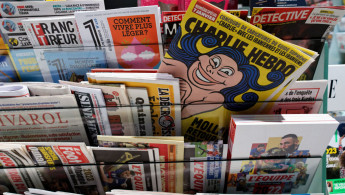Lebanon's Hezbollah condemns Charlie Hebdo cartoons mocking Iranian leaders
Lebanon’s militant Hezbollah group on Tuesday condemned the cartoons published recently by the French satirical magazine Charlie Hebdo that mocked Iran's ruling clerics and urged France to punish the publication.
The Iran-backed Hezbollah said the offensive caricatures were an "ugly act by the magazine" that targeted Iran’s Supreme Leader Ayatollah Ali Khamenei, revered as the spiritual leader for tens of millions of pious Shias throughout the world, including in Lebanon.
There was no immediate comment from France.
Charlie Hebdo has a long history of publishing vulgar cartoons mocking Islamists, which critics say are deeply insulting to Muslims. Two French-born al-Qaida extremists attacked the newspaper’s office in 2015, killing 12 cartoonists, and it has been the target of other attacks over the years.
Its latest issue features the winners of a recent cartoon contest in which entrants were asked to draw the most offensive caricatures of Khamenei. The contest was billed as a show of support for the months-long anti-government protests rocking Iran.
One of the finalists depicts a turbaned cleric reaching for a hangman’s noose as he drowns in blood, while another shows Khamenei clinging to a giant throne above the raised fists of protesters. Others depict more vulgar and sexually explicit scenes.
"We call upon the French government to take decisive measures to punish those behind the act for attacking dignitaries of a whole nation," Hezbollah said in a statement. "The French government ... should not be a partner in this offence."
Members of Hezbollah, a Shia group, also consider Khamenei as their religious leader.
Charlie Hebdo, which has published similarly offensive cartoons about dead child migrants, virus victims, neo-Nazis, popes, Jewish leaders and other public figures, presents itself as an advocate for democracy and free expression. But it routinely pushes the limits of French hate speech laws with often sexually explicit caricatures that target nearly everyone.





 Follow the Middle East's top stories in English at The New Arab on Google News
Follow the Middle East's top stories in English at The New Arab on Google News


